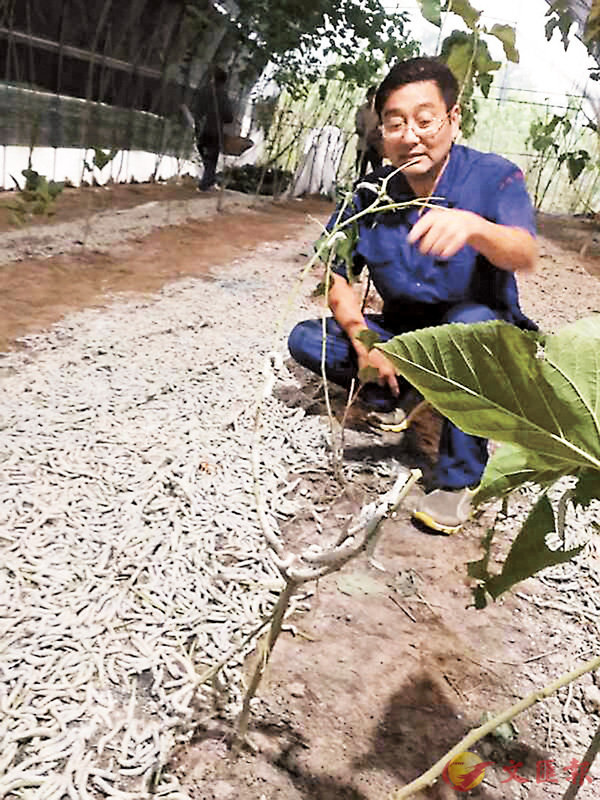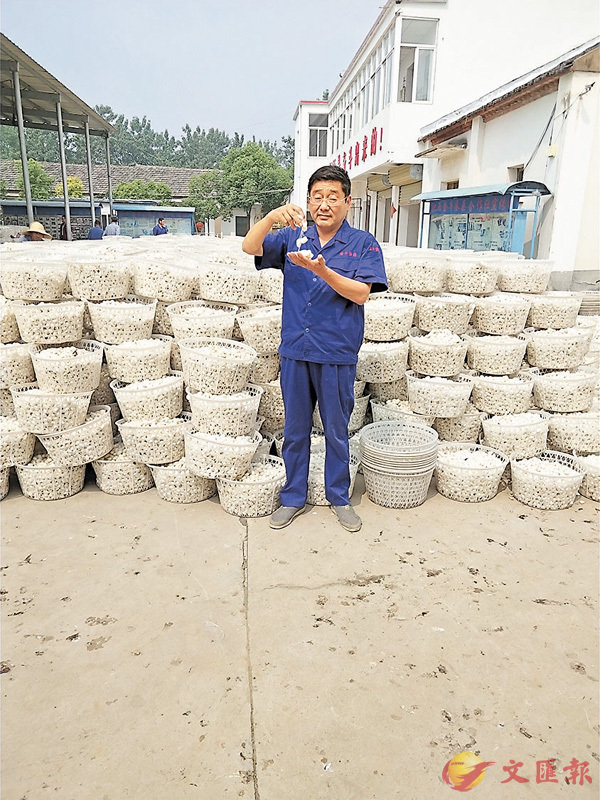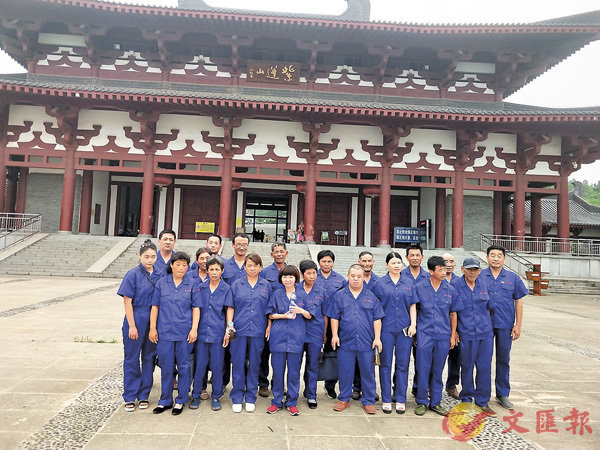
Zhao Qihua inspected the rearing of silkworms. Figure: Anhui Fax of Hong Kong Wenhui Daily
Zhao Chen, a reporter from Hong Kong Wen Wei Po, reported from Anhui that in 1978, Zhao Qihua, an Anhui farmer, allocated land to each household by means of production quotas. Instead of planting rice and wheat on a regular basis, he reclaimed two mu of land for mulberry and silkworm cultivation. Today, Zhao Qihua is the chairman of the Jinniu Sericulture Farmers' Professional Cooperative in Feixi County, Anhui Province. The cooperative is the largest sericulture national demonstration cooperative in the province. It has more than 3000 mu of mulberry fields and more than 7000 silkworms, and can achieve an annual output value of more than 16 million yuan (RMB, the same below). When Zhao Qihua introduced his experience in sericulture, he proudly said: "40 years, growing together with reform and opening up". It is precisely because of tens of thousands of ordinary practitioners like Zhao Qihua who dare to do things, that the country has become increasingly prosperous and strong since the reform and opening up.
Zhao Qihua, 56 years old, is from Liqiao Village, Shannan Town, Feixi County, Hefei City, Anhui Province. His sericulture farmers' professional cooperative is located in Jinniu Community, Shannan Town. When entering the cooperative, the words "show the sericulture farmers how to lead the big families" in front of the office building are particularly conspicuous. In the summer, Hefei is in the heat of more than 30 degrees. Zhao Qihua is still busy cleaning up the silkworm room to welcome the coming new batch of young silkworms. He told the Wen Wei Po reporter of Hong Kong that since the introduction of Huakang No. 2 purulent silkworm eggs, the cooperative has had a high yield in every season. Now he is experimenting with high temperature silkworm rearing in summer. After the cocooning yield reaches the standard, he can raise 10 batches of silkworms a year, which can drive the local silkworm farmers to jointly achieve the goal of increasing the income of the silkworm industry by 10 times.
In 1978, Anhui suffered from a hundred year drought, and the crop harvest was greatly reduced. Xiaojingzhuang in Shannan District of Feixi County (now Shannan Town of Feixi County) initiated the household production quota in September of that year. Zhao Qihua has just graduated from high school and has been allocated four and a half acres of land. Instead of growing rice and wheat like other farmers, young Zhao Qihua took out two mu of land to plant mulberry trees and raise silkworms. "At that time, when grain was the key link, I was bold in doing so, and all the elders in the village were against me, saying that I didn't do my job properly." Zhao Qihua said that Shannan Town was located in the watershed between the Yangtze River and the Huaihe River, and was prone to drought due to lack of water. At that time, irrigation was not convenient, and the rice harvest was not good. He consulted the technician of Shannan District Agricultural Technology Station. Such land is suitable for planting mulberry trees. After planting mulberry trees on two mu of their own land, Shannan Brick and Tile Factory also began to develop cash crops, planting mulberry trees on more than 30 mu of spare land. With the recommendation of the Agricultural Technology Station, Zhao Qihua started to raise silkworms in brick and tile factories at the same time since 1979. "The first time I raised silkworms, a large number of them died because I didn't understand their habits and rearing skills, and both the silkworms in the silkworm factory and my own silkworms earned very little." Zhao Qihua, who thought that raising silkworms was very simple, realized that raising silkworms was a technical job, and it was impossible not to learn.
System learning to become an expert
Later, with the recommendation of the Agricultural Technology Station, Zhao Qihua attended the sericulture training class held by the Anhui Sericulture Research Institute and systematically learned the sericulture technology. "Silkworm rearing is most afraid of getting sick, so disinfection and disease prevention in the process of silkworm rearing are the most critical." Zhao Qihua practiced the technology he learned in the silkworm factory and his own silkworm room, and the cocoon harvest was great that autumn. In that year, one kilogram of cocoons sold for 1.9 yuan, and the income from mulberry planting and silkworm rearing was about three times that of rice planting. Later, more and more farmers began to raise silkworms at home in Shannan District. Zhao Qihua also became a sericulture technical instructor of the local agricultural technology station because of his mastery of sericulture technology. Zhao Qihua introduced that in the following ten years, he had done technical guidance in all villages in Shannan District. At that time, he experimented with the silkworm breeding technology he had learned and studied in his own fields and silkworms, and at the same time, he passed on the summarized experience to local silkworm farmers. Now, driven by him, the whole Shannan Town has 11000 mu of mulberry fields. Zhao Qihua, with his love for sericulture and continuous study and research, won 5 national intellectual property invention patents, 11 utility model patents, etc. in sericulture technology, and became a well-known local sericulture expert.
Silk is a luxury, and its price is very vulnerable to the economic environment. While planting mulberry and sericulture, Zhao Qihua also carried out cocoon purchase service in the local area. In 1997, after he bought farmers' cocoons at a price of nearly 8 yuan per kilogram, the financial storm suddenly hit, and the price of cocoons fell to 5 yuan per kilogram. "The cocoons could not be sold. Many silk factories closed down, and I lost more than 300000 yuan, which was quite a big number in 1997!" Zhao Qihua now recalls laughing that he was reluctant to go to a restaurant all that year. The only time he went to a restaurant for dinner was when someone invited him. In 2008, the world financial crisis broke out again. Zhao Qihua's cooperative was just established at that time. He bought 300000 jin of cocoons from farmers at the price of 12 yuan per jin, and finally the price fell to less than 10 yuan per jin. Zhao Qihua finally mortgaged his house, which filled the loss of more than 600000 yuan.
"Lead the way" initiative to expand the market
In recent years, the sericulture industry in the mainland has developed steadily, and today the price of cocoons has reached 25 yuan per jin. Zhao Qihua said that with the continuous reform and opening up of the country, the future development space of the sericulture industry will be greater. He introduced that before China's accession to the World Trade Organization (WTO), there were quota restrictions on textile exports, which to some extent affected the sales of silk and the development of sericulture industry. After China's accession to the WTO, from January 1, 2005, the former textile export restriction countries had cancelled their quota restrictions on China. Now the national "Belt and Road" initiative has also brought more markets to silk exports. The cooperative's form of group development has further increased Zhao Qihua's ability to withstand risks. After the financial crisis in 2008, he invested more than 3 million yuan to build a sericulture industrial park, which has now developed into a professional park integrating sericulture production, technical guidance, drying processing, sales services, leisure and tourism. His career is getting better and better. Zhao Qihua said that he firmly believes that the sericulture industry, which is profitable and environmentally friendly, is a sunrise industry. He hopes to further expand and refine this industry.
Income from trying to raise silkworm at high temperature increases greatly

Zhao Qihua bought the cocoons of silkworm farmers.
Over the past 40 years, Zhao Qihua has experienced variety iteration and technology update in the sericulture industry, and has realized more than 10 technological innovations in the industry. He told the Hong Kong Wen Wei Po reporter that whenever a new silkworm variety appeared, he would try and improve it in his own silkworm garden as soon as possible, and then promote it to farmers after success. At the same time, with the increasing cost of human resources and the increasing shortage of land resources, Zhao Qihua is also committed to inventing labor-saving equipment for sericulture and a new model for sericulture. The 40 years of reform and opening up have brought China's position as the world's second largest economy. Zhao Qihua, through continuous exploration and accumulation, has promoted the technological innovation and product diversification of his sericulture industry. He and the sericulture farmers in the cooperatives have seen that the income from sericulture is likely to rise 10 times than before.
Zhao Qihua introduced that China's sericulture industry started with raising spring silkworms once a year, and later developed into raising spring and autumn silkworms twice a year. The second change in sericulture was to control the temperature, and raise two batches of spring and autumn silkworms respectively, which were divided into early spring, late spring, early autumn and late autumn, to achieve four batches a year. At present, Huakang No. 2 silkworm, bred by the Silkworm Research Institute of the Chinese Academy of Agricultural Sciences, can not only resist pus disease, but also resist high temperature. Zhao Qihua began to raise silkworms at a high temperature of 30 to 40 degrees last year. "Because the silkworm grows fast in summer, one batch can be raised in 18 days. If the experiment is successful, Hefei can raise four batches in summer for a long time." Zhao Qihua also plans to raise three batches of silkworm in spring and autumn every season through temperature control, and his goal is to raise ten batches of silkworm a year. On this basis, we will further reduce the planting and breeding costs and expand the deep processing industrial chain of silk products such as silk quilts. "The goal of increasing the income by 10 times can be fully achieved". Zhao Qihua said that the amount of cocoons produced by the high-temperature silkworm rearing he tried is very close to the expected goal initially envisaged.
Have "rich" share to help the disabled get rid of poverty

Zhao Qihua (first from the right) leads disabled employees to visit Hefei Scenic Area.
Since 2013, Zhao Qihua has cooperated with Feixi County Disabled Persons' Federation to help 30 disabled families in Shannan Town get rid of poverty by planting mulberry and sericulture in the form of technical poverty alleviation. In the first year, these 30 disabled families got rid of poverty smoothly. Zhao Qihua has started to help more disabled families get rid of poverty by sericulture at an annual growth rate of 30% under the condition of remarkable poverty alleviation effect of technology.
Zhao Qihua's Jinniu Sericulture Farmers' Specialized Cooperative now has 358 members, including 97 disabled members, with an average annual income of more than 30000 yuan. At the same time, 35 poverty-stricken households were registered and filed, and 20 disabled persons were arranged for employment. Zhao Qihua often said that if one person is rich, he is not rich. Now he has the ability to help more people. Why not. This year, the poverty alleviation industrial park, which Zhao Qihua is responsible for operating, will be put into use. At that time, Zhao Qihua will drive more poverty-stricken households and disabled people out of poverty and employment through the sericulture industry.
Zhao Qihua introduced that these disabled employees are divided into intellectual disability, mild physical disability and mental illness, and every five disabled employees are equipped with a nurse. The Industrial Park allocates work within their ability to each disabled employee's situation. Zhao Qihua introduced that, in order to take care of the special situation of such employees, every disabled employee, in addition to not working on statutory holidays and public holidays, will also arrange rest in extremely hot and cold weather, and work no more than 6 hours a day. The salary of employees ranges from 1260 yuan to 3000 yuan. More work pays more. Zhao Qihua said that in this way, not only can these disabled people promote their recovery through work exercises, but also increase their sense of social integration, killing two birds with one stone.



